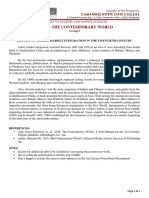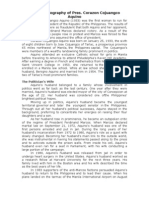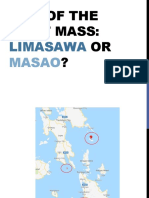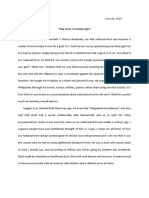0 ratings0% found this document useful (0 votes)
74 viewsThe Start of American Era
The Start of American Era
Uploaded by
Miguel Angelo RositaThe document summarizes key events around the start of American rule in the Philippines. It discusses (1) American officials denying promises of independence to Filipino revolutionaries, (2) the proclamation of Philippine independence in 1898, (3) warnings of Apolinario Mabini about the US taking control from Spain, (4) individuals important in the independence declaration, (5) the Treaty of Paris transferring control from Spain to the US, and (6) the Philippine-American War and capture of Emilio Aguinaldo.
Copyright:
© All Rights Reserved
Available Formats
Download as PPTX, PDF, TXT or read online from Scribd
The Start of American Era
The Start of American Era
Uploaded by
Miguel Angelo Rosita0 ratings0% found this document useful (0 votes)
74 views14 pagesThe document summarizes key events around the start of American rule in the Philippines. It discusses (1) American officials denying promises of independence to Filipino revolutionaries, (2) the proclamation of Philippine independence in 1898, (3) warnings of Apolinario Mabini about the US taking control from Spain, (4) individuals important in the independence declaration, (5) the Treaty of Paris transferring control from Spain to the US, and (6) the Philippine-American War and capture of Emilio Aguinaldo.
Original Title
The-Start-Of-American-Era
Copyright
© © All Rights Reserved
Available Formats
PPTX, PDF, TXT or read online from Scribd
Share this document
Did you find this document useful?
Is this content inappropriate?
The document summarizes key events around the start of American rule in the Philippines. It discusses (1) American officials denying promises of independence to Filipino revolutionaries, (2) the proclamation of Philippine independence in 1898, (3) warnings of Apolinario Mabini about the US taking control from Spain, (4) individuals important in the independence declaration, (5) the Treaty of Paris transferring control from Spain to the US, and (6) the Philippine-American War and capture of Emilio Aguinaldo.
Copyright:
© All Rights Reserved
Available Formats
Download as PPTX, PDF, TXT or read online from Scribd
Download as pptx, pdf, or txt
0 ratings0% found this document useful (0 votes)
74 views14 pagesThe Start of American Era
The Start of American Era
Uploaded by
Miguel Angelo RositaThe document summarizes key events around the start of American rule in the Philippines. It discusses (1) American officials denying promises of independence to Filipino revolutionaries, (2) the proclamation of Philippine independence in 1898, (3) warnings of Apolinario Mabini about the US taking control from Spain, (4) individuals important in the independence declaration, (5) the Treaty of Paris transferring control from Spain to the US, and (6) the Philippine-American War and capture of Emilio Aguinaldo.
Copyright:
© All Rights Reserved
Available Formats
Download as PPTX, PDF, TXT or read online from Scribd
Download as pptx, pdf, or txt
You are on page 1of 14
The Start Of American Era
The Start Of American Era
The Denial Of Spencer Pratt:
According to General Emilio Aguinaldo, the
American Consul General conveyed the assurance
of the United States Government to Commodore
Dewey through a telegraph the recognition of the
Philippine Independence
The Start Of American Era
Spencer Pratt categorically contested
Aguinaldo’s claim of these events , and
denied any “dealings of political
character” with Aguinaldo
The Start Of American Era
Admiral George Dewey also disproved
Aguinaldo’s account , stating he did not
promise anything regarding the Independence
of the Philippines
The Start Of American Era
“From my observation of Aguinaldo and his
advisers , I decided that it would be unwise to
cooperate with him or his adherents in an
official manner.. In short , my policy was to
avoid any entangling alliance with the
insurgents, while I appreciated that , pending
the arrival of our troops, they might be of
service” (Admiral Dewey)
The Start Of American Era
Proclamation of Philippine Independence in
Kawit, Cavite:
On June 12, 1898 , General Emilio Aguinaldo
proclaimed the independence of the Philippines in
his house in Cavite El Viejo (now Kawit)
Ambrosio Bautista wrote the Declaration of
Philippine Independence
The Start Of American Era
Who is Apolinario Mabini:
In April 1898 he penned a manifesto on the
Spanish –American War, presciently warning other
Philippine revolutionary leaders that Spain would
likely cede the Philippines to the United States if it
lost the war , urging them to continue to fight for
independence
The Start Of American Era
Persons significant in the declaration of
Philippine Independence:
1. Marcela Agoncillo – a Filipina renowned
in Philippine history as the principal
seamstress of the first and official Philippine
flag, gaining her the title of “mother of the
Philippine flag”
The Start Of American Era
2. Julian Felipe – his composition titled ‘Marcha
Nacional Filipinas” was played by the San
Francisco Malabon as the Philippine flag was
hoisted during the declaration of Philippine
independence on June 12, 1898 in General
Aguinaldo’s house in Kawit,Cavite
The Start Of American Era
3. Jose Palma – he wrote the poem
“Filipinas” 1899 that was used as the lyrics
of the Philippine National Anthem
The Start Of American Era
The Treaty Of Paris:
An agreement between Spain and United
States which ceded the control of the
Philippines by Spain to America to the tune
of $20M
The Start Of American Era
The Formation of Malolos Congress:
After proclaiming the Philippine
Independence on June 12, 1898 , President
Emilio Aguinaldo with Apolinario Mabini
then ordered the convening of a revolutionary
congress at Malolos, Bulacan
The Start Of American Era
Philippine-American War (1899-1901)
Who is General Anotonio Luna ?
The Capture of Emilio Aguinaldo
The Start Of American Era
Who is General Gregorio Del Pilar ?
Who is Macario Sakay ?
Who is Miguel Malvar?
You might also like
- Eglobe G2 User's Guide Version Rev 2.0.3 - Eglobe 2.1.0.x AUG 2020Document278 pagesEglobe G2 User's Guide Version Rev 2.0.3 - Eglobe 2.1.0.x AUG 2020nikoNo ratings yet
- Tensei Shitara Slime Datta Ken (PDFDrive)Document283 pagesTensei Shitara Slime Datta Ken (PDFDrive)Anthony BareraNo ratings yet
- The Birth of NationDocument43 pagesThe Birth of Nationjoefrey BalumaNo ratings yet
- History Context of The Martial Law in The Philippines, 1972-1981 Martial LawDocument5 pagesHistory Context of The Martial Law in The Philippines, 1972-1981 Martial LawNur SetsuNo ratings yet
- Biography of Emilio Aguinaldo and The Memoir of HimagsikanDocument17 pagesBiography of Emilio Aguinaldo and The Memoir of HimagsikanJelyn Repil0% (1)
- John FieldDocument25 pagesJohn Fieldcoconut108No ratings yet
- The American InterventionDocument19 pagesThe American InterventionMa Winda Lim100% (1)
- Philippines Spanish-American War United States Spain: Battle of Manila Bay, (May 1, 1898), Defeat of TheDocument19 pagesPhilippines Spanish-American War United States Spain: Battle of Manila Bay, (May 1, 1898), Defeat of TheMarii BelleNo ratings yet
- Content and Contextual AnalysisDocument1 pageContent and Contextual AnalysisAndrian Batayen Torren40% (5)
- Identifying and Diagnosing Problems, The UN's Comparative AdvantageDocument1 pageIdentifying and Diagnosing Problems, The UN's Comparative Advantagevivian ternal100% (1)
- CHAPTER 11 SummaryDocument6 pagesCHAPTER 11 SummaryDenzz QuintalNo ratings yet
- The First Cry of The RevolutionDocument1 pageThe First Cry of The RevolutionSORENI SORENINo ratings yet
- Module 4 The Contemporary WorldDocument9 pagesModule 4 The Contemporary WorldMace Elizabeth KingNo ratings yet
- A World of RegionsDocument7 pagesA World of RegionsChen CerroNo ratings yet
- Philippine CartoonDocument19 pagesPhilippine CartoonAnna Teresa MendozaNo ratings yet
- Rhetorical Analysis: Speech of Corazon C. AquinoDocument2 pagesRhetorical Analysis: Speech of Corazon C. AquinoJohn Michael Luzaran ManilaNo ratings yet
- Political Caricatures EditingDocument7 pagesPolitical Caricatures EditingThelmalyn RapatanNo ratings yet
- Group 2 History of Global Market IntegrationDocument1 pageGroup 2 History of Global Market Integrationstephanie canapitNo ratings yet
- 19TH Century Philippines As Rizal Context G2Document33 pages19TH Century Philippines As Rizal Context G2Elvin Jun BugayongNo ratings yet
- Lesson 6-Module 6-Global DividesDocument14 pagesLesson 6-Module 6-Global DividesKaren Ann OreoNo ratings yet
- Chapter 1 fINALDocument36 pagesChapter 1 fINALJohn Mer Insipedo Matilac100% (1)
- Corazon Aquino BiographyDocument3 pagesCorazon Aquino Biographybentecinko25No ratings yet
- Chapter 4 Pre-ActivityDocument6 pagesChapter 4 Pre-ActivityKen Christian GonzalesNo ratings yet
- Spanish EraDocument27 pagesSpanish EraRhenz Mahilum100% (1)
- Module-8-Imagining A NationDocument7 pagesModule-8-Imagining A NationTrisha Pauline PangilinanNo ratings yet
- China-Philippines RelationsDocument4 pagesChina-Philippines RelationsL ANo ratings yet
- The Declaration of Philippine IndependenceDocument7 pagesThe Declaration of Philippine IndependenceNatasha ChuNo ratings yet
- Political GlobalizationDocument18 pagesPolitical GlobalizationsaveezaNo ratings yet
- Filipino ArtistsDocument13 pagesFilipino ArtistsPhilipReyesNo ratings yet
- Module 6 10 - Reading in Philippine HistoryDocument47 pagesModule 6 10 - Reading in Philippine Historymarialynnette lusterioNo ratings yet
- Toaz - Info The Assassination of Antonio Luna Reportdocx PRDocument13 pagesToaz - Info The Assassination of Antonio Luna Reportdocx PRMike BibbyNo ratings yet
- Overemphasis On Religious MattersDocument3 pagesOveremphasis On Religious MattersMarscelinee VitoNo ratings yet
- LESSON 1 GCWORLD The Contemporary WordlDocument11 pagesLESSON 1 GCWORLD The Contemporary Wordlshaina juatonNo ratings yet
- Filipino Visual ArtistsDocument33 pagesFilipino Visual ArtistsCrishNo ratings yet
- Content and Contextual Analysis: Speech of Corazon AquinoDocument8 pagesContent and Contextual Analysis: Speech of Corazon AquinoShenn ShennNo ratings yet
- Chapter 7 Reading and Analysis of Primary Sources 2Document7 pagesChapter 7 Reading and Analysis of Primary Sources 2Ace AbiogNo ratings yet
- Pre-Colonial PhilippinesDocument28 pagesPre-Colonial PhilippinesCarlosJohn02100% (1)
- El Presidente Movie ReviewDocument4 pagesEl Presidente Movie ReviewJames Roi Dela CruzNo ratings yet
- Lesson 6 - Global Divides The North-SouthDocument25 pagesLesson 6 - Global Divides The North-SouthNestor CabacunganNo ratings yet
- Kartilya NG KatipunanDocument38 pagesKartilya NG KatipunanMae RocelleNo ratings yet
- Presentation1 1Document37 pagesPresentation1 1NinaGonzalesNo ratings yet
- Manuel Roxas Research PaperDocument20 pagesManuel Roxas Research PaperAbigail Bagnes100% (2)
- Module 2 RPHDocument21 pagesModule 2 RPHKristine KimNo ratings yet
- 1.a Site of The First Mass 2Document34 pages1.a Site of The First Mass 2Zia Briones0% (1)
- 19th Century Philippines As Rizal's ContextDocument20 pages19th Century Philippines As Rizal's ContextJennifer CotillonNo ratings yet
- Course Module in RiphDocument309 pagesCourse Module in RiphGehrard Ivan Lee MagpantayNo ratings yet
- Speech of CoryDocument6 pagesSpeech of CoryKenchi CasanaresNo ratings yet
- History ReportDocument47 pagesHistory ReportVincent Duran Cuzon100% (1)
- WEEK 1 and 2Document31 pagesWEEK 1 and 2Hanareva ArvesuNo ratings yet
- Gay Issue A Century AgoDocument4 pagesGay Issue A Century AgoElla Jane EngoNo ratings yet
- 7 CH Global Insterstate SystemDocument4 pages7 CH Global Insterstate SystemAndrea SiladanNo ratings yet
- Kathlyn Dennisse V. Labeta BS Accountancy - IADocument1 pageKathlyn Dennisse V. Labeta BS Accountancy - IAbastiNo ratings yet
- Day 5 - Global Divide - Ms. Bualat PDFDocument35 pagesDay 5 - Global Divide - Ms. Bualat PDFNiccolo G. ChiongbianNo ratings yet
- Social ContextDocument23 pagesSocial ContextKyrah Angelica DionglayNo ratings yet
- The Propaganda Movement and The KatipunanDocument9 pagesThe Propaganda Movement and The Katipunanarteezy artour100% (3)
- Report The Cry of RebellionDocument22 pagesReport The Cry of RebellionTrisha palasNo ratings yet
- Eng ART ANALYSISDocument3 pagesEng ART ANALYSISNAPISA, CHERNA SAIRA B.No ratings yet
- Proclamation of The Philippine IndependenceDocument1 pageProclamation of The Philippine IndependenceDeeekayrNo ratings yet
- Global DividesDocument13 pagesGlobal DividesRomelyn Duque DellomesNo ratings yet
- Philippine Social History: Global Trade and Local TransformationsDocument6 pagesPhilippine Social History: Global Trade and Local TransformationsJenny HermosadoNo ratings yet
- AnahDocument80 pagesAnahMiguel Angelo RositaNo ratings yet
- MIDTERMS-Lesson 1 (Philippine Popular Culture)Document30 pagesMIDTERMS-Lesson 1 (Philippine Popular Culture)Miguel Angelo Rosita100% (1)
- MIDTERMS-Lesson 2 (History & Evolution of PH Pop Culture)Document50 pagesMIDTERMS-Lesson 2 (History & Evolution of PH Pop Culture)Miguel Angelo Rosita100% (2)
- Some Conflicting Views in Philippine HistoryDocument49 pagesSome Conflicting Views in Philippine HistoryMiguel Angelo RositaNo ratings yet
- The Start of Filipino Armed StruggleDocument18 pagesThe Start of Filipino Armed StruggleMiguel Angelo RositaNo ratings yet
- Before The ConquestDocument33 pagesBefore The ConquestMiguel Angelo RositaNo ratings yet
- American Infiltration in The PhilippinesDocument20 pagesAmerican Infiltration in The PhilippinesMiguel Angelo RositaNo ratings yet
- What Is HistoryDocument21 pagesWhat Is HistoryMiguel Angelo RositaNo ratings yet
- Topic 2 - Laws of The SeaDocument18 pagesTopic 2 - Laws of The SeaMiguel Angelo RositaNo ratings yet
- Topic 1 - International Human Rights LawDocument16 pagesTopic 1 - International Human Rights LawMiguel Angelo RositaNo ratings yet
- Philippine Revolution Under Aguinaldos LeadershipDocument15 pagesPhilippine Revolution Under Aguinaldos LeadershipMiguel Angelo RositaNo ratings yet
- The American RuleDocument17 pagesThe American RuleMiguel Angelo RositaNo ratings yet
- Art Appreciation Lecture No. 2Document1 pageArt Appreciation Lecture No. 2Miguel Angelo RositaNo ratings yet
- The Meaning and Importance of ArtDocument1 pageThe Meaning and Importance of ArtMiguel Angelo RositaNo ratings yet
- Mathematics As A LanguageDocument27 pagesMathematics As A LanguageMiguel Angelo RositaNo ratings yet
- StartUp 2 ExamView Unit 1 Review Test BDocument6 pagesStartUp 2 ExamView Unit 1 Review Test BRoman SantanaNo ratings yet
- Ukedchat Archive 03 November 2011Document60 pagesUkedchat Archive 03 November 2011Colin HillNo ratings yet
- SupplicationsDocument5 pagesSupplicationsMohammad Faisal SaleemNo ratings yet
- How To Study The Bible (PDFDrive)Document186 pagesHow To Study The Bible (PDFDrive)NathiNo ratings yet
- On His BlindnessDocument7 pagesOn His BlindnessEmmanuel PenullarNo ratings yet
- Week 01 Q3 MilDocument4 pagesWeek 01 Q3 MilNo NameNo ratings yet
- GND English Issue 4 2021Document104 pagesGND English Issue 4 2021Elisha MutemaungaNo ratings yet
- MensurationDocument11 pagesMensurationaditya nimbalkarNo ratings yet
- Look at The PictureDocument13 pagesLook at The PictureX IPS 4Ni Made Winda Maharani28No ratings yet
- Irregular VerbsDocument3 pagesIrregular VerbsCarmen F.No ratings yet
- Alabama Affixes and Important WordsDocument28 pagesAlabama Affixes and Important Wordsalibamu montlerNo ratings yet
- Basics of SQLDocument47 pagesBasics of SQLroshannarayanNo ratings yet
- Listening EnglishDocument9 pagesListening Englishwnputrio07No ratings yet
- Information About The Identity FirewallDocument28 pagesInformation About The Identity FirewallGowrishankar RamasamyNo ratings yet
- Winter Holidays. Speaking+WritingDocument1 pageWinter Holidays. Speaking+WritingKatrinaNo ratings yet
- People Media People in Media and People As MediaDocument13 pagesPeople Media People in Media and People As MediaNathaniel Andres100% (3)
- Top 30 Cloze Test PDF Dream Big InstitutionDocument10 pagesTop 30 Cloze Test PDF Dream Big InstitutionAditya ThakurNo ratings yet
- PLSQL 15 3 PracticeDocument2 pagesPLSQL 15 3 PracticeIka AgustinaNo ratings yet
- CAD Manual 02 - Glossary 249WNP v6 0Document13 pagesCAD Manual 02 - Glossary 249WNP v6 0zstNo ratings yet
- P1-Jan-2020 QPDocument28 pagesP1-Jan-2020 QPMohamed TarekNo ratings yet
- Practical3b ProgrammingDocument10 pagesPractical3b ProgrammingMuhd ShazanyNo ratings yet
- Do You Teach Young Learners? Join Us For Our WebinarDocument2 pagesDo You Teach Young Learners? Join Us For Our WebinarElla SupealaNo ratings yet
- Monitoring The Primary and Standby DatabasesDocument10 pagesMonitoring The Primary and Standby Databasesssilpa2796No ratings yet
- ClausesDocument1 pageClausesritchelNo ratings yet
- Prophetic Declaration Based On Joshua 1Document7 pagesProphetic Declaration Based On Joshua 1Regine B. BactatNo ratings yet
- Radio ManualDocument11 pagesRadio ManualTommy RockerNo ratings yet
- Concepts of Algorithms Cs211: Teacher: Ghaida Alhamidi G.alhamidi@qu - Edu.saDocument13 pagesConcepts of Algorithms Cs211: Teacher: Ghaida Alhamidi G.alhamidi@qu - Edu.saNora SalehNo ratings yet








































































































